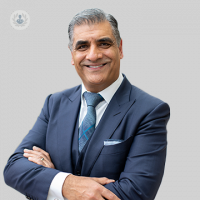TAVI: heart surgery for aortic valve replacement
Autore:TAVI stands for Transcatheter Aortic Valve Implantation and may also be known as TAVR (where ‘R’ stands for Replacement). TAVI is used to treat a condition called severe aortic valve stenosis where the aortic valve has become calcified and tight.
If you are in need of heart valve surgery and are not well enough for the traditional procedure used in valve replacement surgery, you may be given a TAVI operation instead.
We’ve asked one of our highly-experienced cardiothoracic surgeons Mr Inderpaul Birdi to share how the procedure is performed and how it differs from open-heart surgery.

How are TAVI procedures performed?
Most TAVI procedures are performed by passing a guided wire through an artery in the groin over which is inserted the new collapsed aortic valve replacement. Once the TAVI valve is placed in the correct position inside the calcified valve, the TAVI valve is opened into place. TAVI is most useful in patients in whom surgical aortic valve replacement is too risky.
How is it different from standard procedures?
Standard aortic valve replacement is performed through using open-heart surgery through the breastbone. Some surgeons, myself included, can perform this operation without opening the breastbone and instead of placing a small incision between the ribs on the right side of the chest. TAVI does not require any incisions. The compromise of TAVI, however, includes:
- There is a 25% risk of pacemaker (compared to 3-4% with traditional or keyhole heart surgery).
- There is a 25% risk of leaks around the edges of the new TAVI valve with increased risk of shortened life or heart failure (compared to 2-3% with traditional or keyhole heart surgery).
- Unknown long-term durability of the new valve
Why would you have this procedure?
Patients who are not suitable for traditional or keyhole heart surgery because of coexisting illnesses that make surgery too risky are to have TAVI. This is assessed by a specialist heart team like the one at The Keyhole Heart Clinic.
How long are TAVI valves supposed to last?
This is currently unknown but early results indicate that TAVI valves are not as durable as traditional surgical tissue valves, mechanical valves, or carbon valves.
What is the success rate of this?
This depends upon the preoperative risk of the patient but early data has not demonstrated any mortality or stroke reduction in TAVI versus traditional or keyhole surgery.
Book for a consultation with Mr Birdi today!


